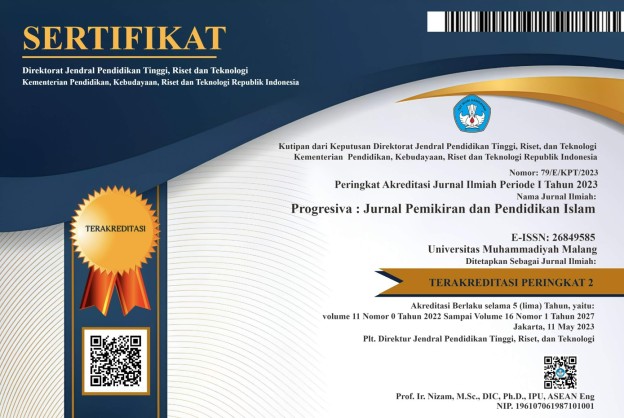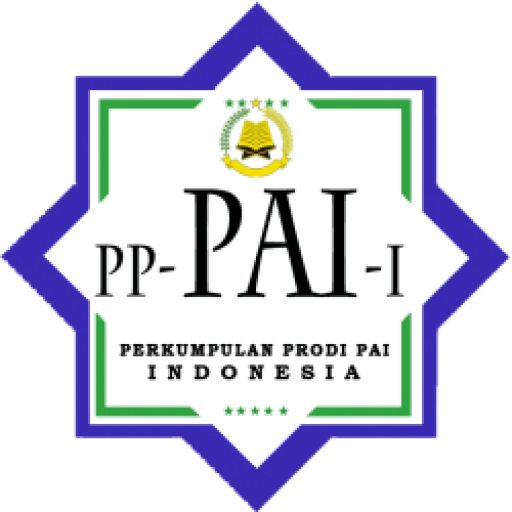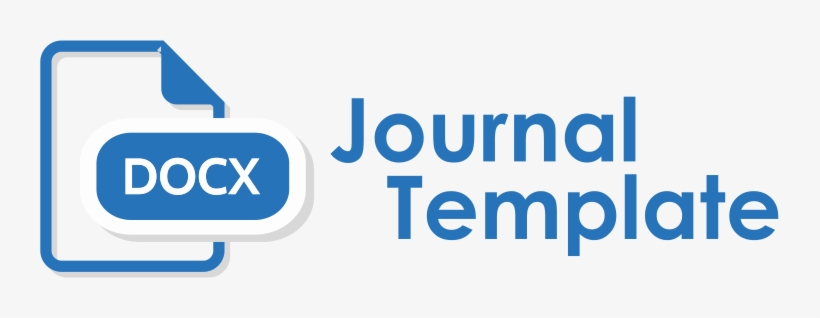Human Ontology in Critical Pedagogy and Its Implications for Multicultural Islamic Education
DOI:
https://doi.org/10.22219/progresiva.v12i01.24933Keywords:
Multicultural Islamic Education, Paulo Freire, Dialogue, HumanizationAbstract
Plurality is an undeniable social reality. But unfortunately, lately there are many phenomena that show tension due to differences in identity. In this article, this is understood as the result of education that is not based on a correct view of human’s true nature. What happens is that education treats humans like programmed machines that can swallow all facts according to the interests of the authorities or elites. This condition is very dangerous because it negates students' ability to understand and reflect on diversity. So that pluralism is only understood as knowledge in theory, not as a reality that occurs every day. Horizontal conflicts are also very prone to occur due to the lack of individual acceptance of multiple realities. Because of this, it is deemed necessary to reorient education so that education is based on the view of the whole human being and enables students to be more adaptive in responding to the reality of plurality. In this article, this effort is made by integrating human ontology of critical pedagogy with the multicultural Islamic religious education. The focus on multicultural Islamic religious education is based on the consideration that religion is an important identity for a person and that Islam is the religion embraced by the majority of the Indonesian population. It is shown here that critical pedagogy understands human nature as an independent, conscious and egalitarian being. This ontology inspires a learning methodology that encourages dialogue, mutual understanding, critical awareness, and produces actions to overcome injustices.
Downloads
References
Abdurrahman, M. (2003). Islam sebagai kritik sosial. Jakarta: Erlangga.
Azra, A., Afrianty, D., & Hefner, R. (2010). Pesantren and madrasa: Muslim schools and national ideals in Indonesia. In Schooling Islam. Princeton, NJ : Princeton University.
Baidhawy, Z. (2004). Pendidikan Agama Berwawasan Multikultural: Sebuah Konsep Alternatif. Taswirul Afkar, 16(1).
Baidhawy, Z. (2005). Pendidikan Agama berwawasan Multikultural. Jakarta: Erlangga.
Bakri, S. (2004). Islam dan Wacana Radikalisme Agama Kontemporer. Dinika, 3(1), 3.
Behizadeh, N. (2016). Enacting problem-posing education through project-based learning. English Journal, (November).
Borge, M., Soto, J. A., Aldemir, T., & Mena, J. A. (2022). Building Multicultural Competence by Fostering Collaborative Skills. Teaching of Psychology, 49(1), 85–92. https://doi.org/10.1177/0098628320977421
Bowe, G. A. (2009). Document Analysis as a Qualitative Research Method. Qualitative Research Journal, 9(2), 27–40. Retrieved from doi:10.3316/qrj0902027
Burson, E., & Godfrey, E. B. (2020). Intraminority solidarity: The role of critical consciousness. European Journal of Social Psychology, 50(6), 1362–1377. https://doi.org/https://doi.org/10.1002/ejsp.2679
Chertoff, M. (2008). The Ideology of Terrorism: Brown Journal of World Affairs, 15(1), 11–20.
Dale, J., & Hyslop-Margison, E. (2010). Paulo Freire: Teaching for Freedom and Transformation. Springer.
Freire, P. (2020). Pedagogy of the oppressed. In Toward a sociology of education (pp. 374–386). Routledge.
Freire, P. (2021). Pedagogy of the Heart. Bloomsbury Publishing.
Gallagher, M., Breines, M., & Blaney, M. (2021). Ontological Transparency, (In)visibility, and Hidden Curricula: Critical Pedagogy Amidst Contentious Edtech. Postdigital Science and Education, 3(2), 425–443. https://doi.org/10.1007/s42438-020-00198-1
Gupta, A., Singh, N., & Duraiappah, A. (2019). Education for humanity: Freire and Sen Re-Examined. In The Wiley Handbook of Paulo Freire (Vol. 206, pp. 1–2). https://doi.org/10.1007/s11270-009-0269-4
Harvey, D. (2007). A brief history of neoliberalism. Oxford University Press.
Hidayat, R. (2013). Pedagogi Kritis: Sejarah, Perkembangan dan Pemikiran. Jakarta: Rajawali Press.
Hilmy, M. (2019). Radical Islamism as a Mode of Production. TEOSOFI: Jurnal Tasawuf Dan Pemikiran Islam, 9(1), 81–108. https://doi.org/10.15642/teosofi.2019.9.1.81-108
Kalsoom, S., Kalsoom, N., & Mallick, R. J. (2020). From Banking Model to Critical Pedagogy: Challenges and Constraints in the University Classrooms. UMT Education Review, 3(1), 25–44. https://doi.org/10.32350/uer.31.02
Ma’arif, A. S. (1991). Pendidikan Islam: Antara Cita dan Fakta. Yogyakarta: Tiara Wacana.
Maemonah, M., Zuhri, H., Masturin, M., Syafii, A., & Aziz, H. (2023). Contestation of Islamic educational institutions in Indonesia: Content analysis on social media. Cogent Education, 10(1). https://doi.org/10.1080/2331186X.2022.2164019
Malterud, K. (2001). Qualitative research: standards, challenges, and guidelines. The Lancet, 358(11).
Mudhoffir, A. M. (2017). Islamic Militias and Capitalist Development in Post-Authoritarian Indonesia. Journal of Contemporary Asia, 47(4), 495–514. https://doi.org/10.1080/00472336.2017.1336564
Papastephanou, M. (2006). Philosophical research and educational action research. Journal of Philosophy of Education, 40(2), 187–203. https://doi.org/10.1111/j.1467-9752.2006.00506.x
Raihani. (2020). A model of Islamic teacher education for social justice in Indonesia a critical pedagogy perspective. Journal of Indonesian Islam, 14(1), 163–186. https://doi.org/10.15642/JIIS.2020.14.1.163-186
Rudnev, M., Magun, V., & Schwartz, S. H. (2018). Relations among higher order values around the world. Journal of Cross-Cultural Psychology, 49(8).
Sabic-El-Rayess, A. (2020). Epistemological shifts in knowledge and education in Islam: A new perspective on the emergence of radicalization amongst Muslims. International Journal of Educational Development, 73(December 2019), 102148. https://doi.org/10.1016/j.ijedudev.2019.102148
Sabic-El-Rayess, A. (2021). How do people radicalize? International Journal of Educational Development, 87, 102499. https://doi.org/10.1016/j.ijedudev.2021.102499
Said, N. (2017). Untuk Humanisme Islam Di Indonesia. Edukasia : Jurnal Penelitian Pendidikan Islam, 12(2), 409–434. Retrieved from http://journal.iainkudus.ac.id/index.php/Edukasia/article/view/2445
Setiawan, E. (2022). Bom Bunuh Diri di Gereja Katedral Makassar dalam Kajian Pierre Bourdieu. Jurnal Al-Hikmah, 20(1), 55–64. https://doi.org/10.35719/alhikmah.v19i2.72
Sofjan, D. (2020). Learning about religions: An indonesian religious literacy program as a multifaith site for mutual learning. Religions, 11(9), 1–11. https://doi.org/10.3390/rel11090433
Tavarez, V. (2023). A century of Paulo Freire. In Social Justice, Decoloniality, and Southern Epistemologies within Language Education. Routledge.
Trout, L. M., & Url, S. (2013). Attunement to the Invisible : Applying Paulo Freire ’ s Problem-Posing Education to Published by : University of Illinois Press on behalf of the Society for the Advancement of American Philosophy Attunement to the Invisible : Applying Paulo Freir ? s Prob. The Pluralist, 3(3), 63–78.
Valenzano, N. (2021). Marxist and Personalist influences in Paulo Freire’s pedagogical anthropology. Tendencias Pedagógicas, 38(1), 68–82.
Wahid, A. (1984). Pengantar. In Pendidikan sebagai Praktik Pembebasan. Jakarta: Gramedia.
Downloads
Published
How to Cite
Issue
Section
License
Copyright (c) 2023 Ahmad Sulaiman, Siti Azizah, Rahmat Hidayatullah

This work is licensed under a Creative Commons Attribution-ShareAlike 4.0 International License.


















